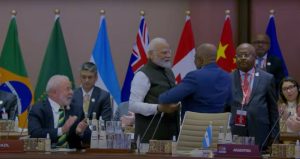The African Union has officially joined the Group of 20 nations (G20) as announced by Indian Prime Minister, Narendra Modi, on Saturday, September 9, 2023, during the world leaders’ summit in New Delhi, India.

The African Union is the second regional to join the G20 after the European Union. South Africa has been the only member from the continent.
By joining the G20, Africa has been elevated to the top of the world’s most powerful governance bodies. The membership is said to be an opportunity for the continent to resolve the issues of climate change, trade and debt.
According to observers, this is Africa’s opportunity to lead the world in aligning climate and development policies and accelerating the transition to renewable energy.
Moussa Faki Mahamat, Chairperson of the African Union Commission, said: “I welcome the African Union’s entry into the G20 as full member. This membership, for which we have long been advocating, will provide a propitious framework for amplifying advocacy in favour of the continent and its effective contribution to meeting global challenges.”
William Ruto, President of the Republic of Kenya, said: “We welcome AU, representing the fastest growing continent, getting a seat in G20. This will give African interests and perspectives voice and visibility in this important body.
“With Africa poised to grow in the coming years, a seat will allow it to shape the decisions of G20 to ensure the continent’s interests are advanced. The outcome of the just concluded Africa Climate Summit including fundamental reforms of international financial institutions and multilateral development banks. is one thing that AU will advance.”
Neema Lugangira, Member of Parliament, Tanzania: “Despite Africa being a resource-rich continent and biggest market for other continents; Africa still remains in economic and social hardships and therefore it is a significant step for the African Union joining the G20. This will enable Africa’s voice be represented with the world’s largest economies and safeguard the interests of Africa so that we attain our rightful economic and social development.”
Faten Aggad, Senior Advisor on Climate Diplomacy and Geopolitics at the African Climate Foundation (ACF): “The G20 just welcomed AU as its new member. Congratulations to those who have long advocated for it. But we will now need to roll up our sleeves & get to work to ensure that this will actually deliver for Africa and not become an opening of influence for the interest of others.
“This means that we urgently need to put in place a clear structure and support mechanisms to ensure that whoever is sitting on that chair is representative of AU views. We need transparency, consultation processes to be able to use this platform effectively.”
Fadhel Kaboub, Associate Professor of Economics, Denison University, and President, Global Institute for Sustainable Prosperity: “While it is important to give the African Union the voice it deserves in international fora, it is unfortunately not clear that the AU has its own long term strategic vision to position itself economically and geostrategically on equal footings with major economic blocs like the US, the EU, and China for example. If joining the G20 (or any other formations) reproduces the colonial and neocolonial role Africa was assigned in the past, then having a seat at the table will not be sufficient to serve Africa’s interest.
“Africa, and the Global South in general, cannot continue to play the role of 1. source of cheap raw materials, 2. large consumer market for the Global North, 3. low cost exotic tourism destinations, and 4. bottom of the global manufacturing value chain, low value-added assembly line manufacturing for obsolete manufacturing that is no longer needed in the Global North, delivered to us in the name of ‘development’, ‘trade’, ‘partnership’ and ‘cooperation’.
“The AU now has an opportunity to use its G20 permanent seat to craft a win-win pathway for the entire world with an uncompromising demand to redesign the global trade, finance, and investment architecture. The Global South vision must align development and climate solutions in three core areas. 1. investments in food sovereignty (not just food security) and agroecology. 2. investments in renewable energy sovereignty. And 3. High-value added industrial policies to leverage the complementarity of resources (critical minerals), capabilities, and the economies of scale available to us in the Global South.
“This is also Africa’s opportunity to lead the world in the Just Transition framework on Global South terms: align climate and development policies, rapid phase out of all fossil fuels, restoring food sovereignty in the Global South, and leapfrog to a renewable energy system via Global South industrial policies.”
Mohammed Adow, Founder and Director, Powershift Africa: “The inclusion of the African Union into the G20 has long been talked about so it’s good to see it finally coming. Hopefully adding countries on the very front line of the climate crisis will provide some impetus to improve the quality and urgency of the G20’s response to climate change. For too long the G20 has dragged its feet, making promises on climate then failing to act on them. We need to see African leaders holding the G20 polluters feet to fire and turn it into a group that takes the lead on climate action.”
Joab Okanda, Pan Africa Senior Advocacy Advisor, Christian Aid: “The global decision-making spaces where international economic and climate response policies are designed and implemented have for a long time been fundamentally undemocratic and structurally underrepresented the Global South and in particular countries on the frontline of the climate and economic crises.
“The African Union’s admission to the G20 is welcome. I hope its inclusion to this unofficial but powerful global decision-making body is not just about having a seat at the table but a real opportunity to define what’s on the menu for majority of poor countries and an impetus to act with the urgency and scale of ambition needed to deal with the intersecting crises of climate, hunger, and debt.”
